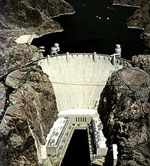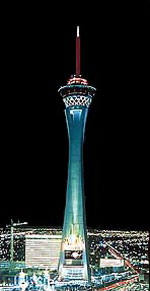Las Vegas History
The city of Las Vegas began to develop as an important stop along the Old Spanish Trail between Santa Fe, New Mexico and southern California for much of the 19th century. The oasis enabled Spanish traders to shorten their route to Los Angeles by cutting directly across the desert. In 1829, descriptions of the lush valley were circulated, generating a lot of interest. In 1844, John C. Fremont, an explorer, camped in the Las Vegas Valley and described the fertile landscape in his journals. Missionaries from the Church of Jesus Christ of Latter-day Saints (the Mormon Church) began an intermittent settlement of the Las Vegas Valley in 1855. This settlement linked to California and the Pacific Ocean.
 The construction of the railroad in 1905 stabilized the valley and an era of slow growth followed. The population began thriving in the 1930's. The construction of the Boulder Dam, (called the Hoover Dam in 1931) on the Colorado River brought jobs, growth, city development, and major federal funds as it was the largest dam in the world at the time.
The construction of the railroad in 1905 stabilized the valley and an era of slow growth followed. The population began thriving in the 1930's. The construction of the Boulder Dam, (called the Hoover Dam in 1931) on the Colorado River brought jobs, growth, city development, and major federal funds as it was the largest dam in the world at the time.
The legalization of gambling also facilitated the modern era of Las Vegas. By the early 1940s, downtown Las Vegas had several luxury hotels and a dozen small but successful gambling clubs. In 1941 a businessman by the name of Thomas Hull, who owned a string of motor inns in California, decided to open the El Rancho Las Vegas, just outside the city limits right off the highway from Los Angeles.
 The El Rancho had 100 motel rooms, a western styled casino, it was located right off the highway and had a large parking lot with an inviting swimming pool in the middle. The El Rancho's quick success led to the building of another property down the road called the Last Frontier Hotel. Thus the Las Vegas Strip was born. With the legalization of gambling, the construction of the Flamingo Casino by gangster Bugsy Siegel started in 1945. Soon after, other lavish casinos opened, most of which were influenced or owned by criminals. After the war, hotel and motel construction boomed, with each new casino boasting more luxurious accommodations than the last.
The El Rancho had 100 motel rooms, a western styled casino, it was located right off the highway and had a large parking lot with an inviting swimming pool in the middle. The El Rancho's quick success led to the building of another property down the road called the Last Frontier Hotel. Thus the Las Vegas Strip was born. With the legalization of gambling, the construction of the Flamingo Casino by gangster Bugsy Siegel started in 1945. Soon after, other lavish casinos opened, most of which were influenced or owned by criminals. After the war, hotel and motel construction boomed, with each new casino boasting more luxurious accommodations than the last.
The growth of Las Vegas has continued beyond our wildest imaginations. Las Vegas is no longer just the home of prime rib buffets and black jack. Las Vegas is now home to the best chefs and restaurants in the world, exciting live shows, incredible shopping and the ultimate in video and table games. Much of this is due largely in part to Casino Owner Extraordinaire, Steve Wynn.
At present, the city plans to establish various districts to attract visitors less interested in gaming who want to experience wonders of art, music, etc. The face of "Fabulous Las Vegas" is in constant growth and change. What could be more thrilling? Where else would you want to live?
Other Topics of Interest
- About Las Vegas
- Las Vegas Golf Courses
- Las Vegas Schools
- Las Vegas Demographics
- Las Vegas Weather
- Las Vegas Gasoline Prices
- Summerlin Community
- Living in Las Vegas
- Recreational Activities
NOTE: Information on this site is not guaranteed to be accurate. Much of the content is compiled from 3rd party sources. If you are aware of incorrect or outdated information, feel free to contact us.




